We're delighted to launch our interactive Dietetic Career Framework tool, allowing you to easily view your current level of practice or directly compare multiple levels of practice.
You can use the filter view found on the right hand side to select the levels of practice you would like to see, allowing you to compare where you are now against where you are looking to progress. You are also able to filter for each pillar of practice.
The interactive tool is best viewed on desktop and larger screens.
| Professional Practice | Supportive | Assistive | Pre-Entry | Entry | Enhanced | Advanced | Consultant |
|---|---|---|---|---|---|---|---|
|
PRACTICE Practising safely and effectively within your scope of practice and should have or be developing the capability to: 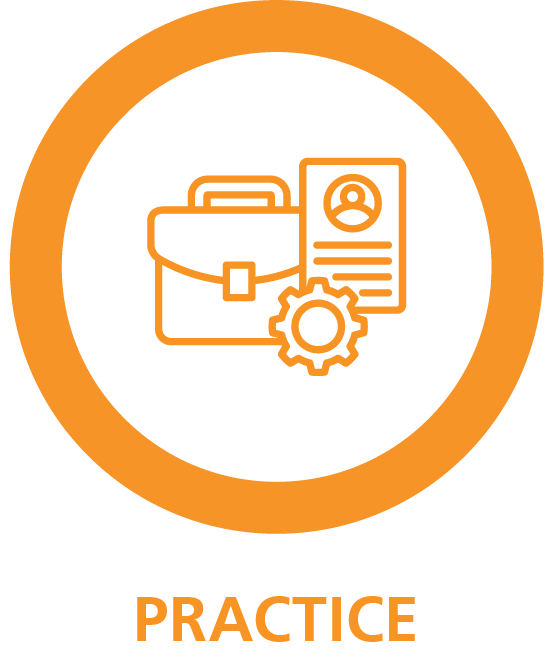
|
Undertake delegated dietetic tasks within the scope of your role and practice, seeking advice and guidance appropriately. |
Undertake delegated dietetic tasks within the scope of your role and practice, seeking advice and guidance appropriately. |
Work within current knowledge, seeking advice appropriately. |
Develop your knowledge and scope of practice with supervision and escalate to senior colleagues if the nutritional intervention is outside of your scope of practice or personal limitations. |
Extend your role (if indicated) with appropriate training and supervision to the benefit of service users, while acknowledging broader risks and implementing proactive risk management systems. |
Negotiate your advanced level scope within legal, ethical, professional and organisational frameworks, prioritising accountability, autonomous decision-making, managing risk and safety. |
Negotiate and regularly re-evaluate both your individual and service-level scope of practice, ensuring alignment with legal, ethical, professional and organisational policies, governance, and procedures. |
|
Perform and document a basic risk assessment prior to undertaking delegated tasks and activities within your scope, role, and practice, escalating any concerns to a registered healthcare professional. |
Recognise the risk associated with the nutrition and dietetic interventions provided and take action to minimise risk. |
Work within current knowledge, seeking advice appropriately. |
Assess and document risk, applying knowledge of the principles of clinical governance in the workplace and applicability to your dietetic role, seeking supervision and escalating as necessary. |
Escalate and manage risk within your team to contribute to service user safety and supervising others to do the same. |
Initiate, evaluate and adapt advanced interventions within your scope of practice, applying professional judgement and demonstrating a critical awareness of your broadened scope of responsibility, autonomy and competence. |
Implement and continuously evaluate systems to manage complex and unpredictable risk, being accountable for professional judgement and supervising teams to ensure safety of service users, their families, workforce and the organisation. |
|
|
Recognise and report potential risks, errors, or behaviours that might lead to adverse outcomes for service users. |
Recognise and report potential risks, errors, or behaviours that might lead to adverse outcomes for service users. |
Work within current knowledge, seeking advice appropriately. |
Recognise and report potential risks, errors, or behaviours that might lead to adverse outcomes for service users, fostering a culture of transparency and continuous improvement. |
Evaluate wider risks associated with your scope of practice and contribute to putting systems in place to proactively manage these risks. |
Manage autonomously, document and communicate risk in complex or unpredictable events, exercising professional judgement and collaborating with multi-professional or multi-agency teams. |
Manage autonomously, document and communicate risk in complex or unpredictable events, exercising professional judgement and collaborating with multi-professional or multi-agency teams. |
|
|
Perform delegated tasks and activities within the scope of your role and practice, following to local policies, procedures while maintaining high standards. |
Perform delegated tasks and activities within the scope of your role and practice, following to local policies, procedures while maintaining high standards. |
Display high standards and act reliably following national standards and frameworks, and local policies and procedures. |
Apply principles from policies and procedures and begin to identify recurrent meaningful patterns in your own professional practice as you gain further experience. |
Contribute to the review, revision and development of local guidelines relating to evolving evidence or best practice, in collaboration with multiprofessional or multi-agency colleagues. |
Facilitate less experienced team members to regularly review local, and regional guidelines, adapting, integrating and proposing modifications where necessary. |
Lead and contribute to developing national and international guidelines within your area of expertise, critically appraising existing guidance and identifying best practice through relevant literature reviews. |
|
|
Plan your own workload including prioritising delegated tasks with guidance. |
Plan, prioritise, implement and monitor your delegated workload. |
Manage own diary and prioritise workload. |
Manage and prioritise workload by assessing need, complexity, and urgency, whilst applying time management skills. |
Implement effective prioritisation of workload, by making informed decisions, managing time efficiently, and maintaining focus on tasks that align with service goals. |
Prioritise your complex workload based on autonomous assessment of need, managing competing priorities across services, in an unpredictable environment. |
Exhibit accountability for your complex workload by autonomously assessing broader service needs and effectively managing competing priorities in potentially unpredictable or rapidly changing environments. |
|
|
Not applicable. |
Contribute to facilitating those in supportive level roles in prioritising their workloads. |
Manage own diary and prioritise workload |
Contribute to facilitating members of the dietetic support workforce in managing their workloads for activities and tasks within the scope of your role and practice. |
Facilitate and support team members to effectively manage their own workload ensuring they balance workplace priorities while maintaining high standards of service provision. |
Empower others to build their capacity for decision making resilience and confidence to deliver high standards in unfamiliar, complex or unpredictable situations. |
Provide strategic leadership to support team members in effectively managing workloads, ensuring they balance priorities, maintain high standards, meet service demands, and foster innovation and improvement. |
|
|
Perform delegated person-centred tasks and activities which support the 'BDA Model and Process for Nutrition and Dietetic Practice', with guidance from assistive level dietetic practitioner or healthcare professional. |
Follow checklists or proformas to undertake delegated, personcentred nutritional assessments and interventions according to the steps in the 'BDA Model and Process for Nutrition and Dietetic Practice'. |
For detailed guidance and additional information specific to the Pre entry level of practice, please refer to the 'BDA Common Assessment Tool (CAT)', available here. |
Implement personcentred nutritional assessment and interventions that are underpinned by the 'BDA Model and Process for Nutrition and Dietetic Practice', applying clinical reasoning. |
Implement safe and effective person-centred care with a particular focus on clinical reasoning, decision making and risk management. |
Lead and contribute to all aspects of care across a specialism, pathway or service which may include ordering and interpreting diagnostic tests and applying advanced clinical reasoning. |
Interpret, evaluate, and integrate values-based professional practice, integrated care or novel interventions to achieve a significant impact across care pathways, services, organisations and systems. |
|
|
Accept delegated tasks following principles of accountability and delegation. |
Delegate tasks to those working at a supportive level, where appropriate. |
For detailed guidance and additional information specific to the Pre entry level of practice, please refer to the 'BDA Common Assessment Tool (CAT)', available here. |
Identify and delegate relevant and appropriate tasks to suitable individuals understanding and following the principles of accountability and delegation. |
Develop and support others to delegate effectively, by providing guidance to ensure the principles of accountability and delegation are understood and followed. |
Evaluate the team or service adherence to the principles of accountability and delegation. |
Lead by delegating tasks appropriately, ensuring alignment with team members’ skills and capabilities, providing necessary resources and support to foster accountability. |
|
|
Act with integrity and honesty, ensuring service users do not experience harm, by reporting to a registered healthcare professional when things have gone wrong. |
Act with integrity and honesty, ensuring service users do not experience harm, by reporting to a registered healthcare professional when things have gone wrong. |
For detailed guidance and additional information specific to the Pre entry level of practice, please refer to the 'BDA Common Assessment Tool (CAT)', available here. |
Contribute to transparent duty of candour conversations with your service users, and where appropriate, their families and carers, when treatment has not met expected standards. |
Initiate duty of candour conversations with service users or, where appropriate, their advocate, carer or family, when issues arise in the treatment or services provided by you or one of your colleagues. |
Investigate issues in treatment or services, provide detailed explanations to service users and carers, and take corrective actions where possible. |
Lead reviews of incidents and duty of candour processes to determine required actions or learning and report outcomes to executives, management, dietetic staff and relevant national agencies. |
|
|
SELF-CARE Maintaining fitness to practice and should have or be developing the capability to: 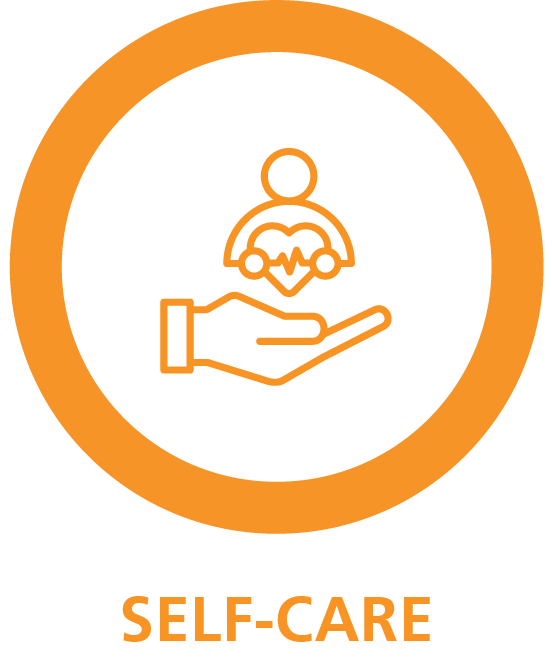
|
Recognise and act on your mental and physical health and wellbeing needs taking appropriate action if your health may affect your ability to practise safely and effectively. |
Recognise and act on your mental and physical health and wellbeing needs taking appropriate action if your health may affect your ability to practise safely and effectively. |
Identify own mental and physical health needs. |
Recognise and act on your mental and physical health and wellbeing needs taking appropriate action if your health may affect your ability to practise safely and effectively. |
Advocate for and be aware of your colleague’s health and wellbeing at work, offering support and taking appropriate action when indicated. |
Demonstrate openness to challenge and ready to constructively challenge others, escalating concerns that affect the safety and wellbeing of individuals, families, carers, communities or colleagues when necessary. |
Lead by recognising and celebrating high performing teams that support workforce wellbeing, consistently demonstrating commitment, empowerment and adherence to clear principles, values, and effective practices. |
|
Identify and apply wellbeing strategies to maintain fitness to undertake duties for current role. |
Identify and apply wellbeing strategies to maintain fitness to undertake duties for current role. |
Employ wellbeing strategies to maintain fitness to practise. |
Implement wellbeing strategies to maintain your fitness to practise, linking with suitably experienced members of the team for signposting. |
Role model strategies for psychological and physical self-care to promote self-awareness in maintaining professional standards and safe working practices for yourself and others. |
Advocate for a culture of self-awareness and wellbeing that upholds professional standards and safe working practices across the team or organisation. |
Lead by cultivating a supportive environment, encouraging wellness practices and regular reviews to ensure team well-being and fitness to practice. |
|
|
Recognise the importance and adhere to your nation’s 'Healthcare Support Worker Code of Conduct' and other relevant standards, such as those set by the BDA. |
Recognise the importance and adhere to your nation’s 'Healthcare Support Worker Code of Conduc't and other relevant standards, such as those set by the BDA. |
Make and support reasonable adjustments to theirs and others’ practice. |
Adhere to the standards of conduct, performance and ethics and standards of proficiency set by HCPC and other relevant standards, such as those set by the BDA. |
Supervise the team’s adherence to the HCPC standards and other relevant standards, such as those set by the BDA. |
Lead the embedding of the HCPC standards and other relevant standards, such as those set by the BDA, educating team members and investigating any breach of professional standards. |
Direct the implementation and evaluation of the HCPC standards and other relevant standards, such as those set by the BDA, for all team members within your role remit. |
|
|
SERVICE USER FOCUS Providing services that are respectful of service user preferences and should have or be developing the capability to: 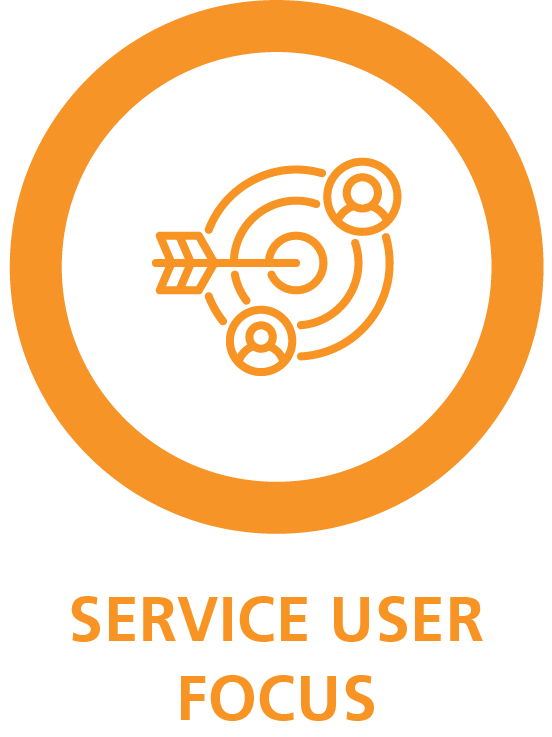
|
Understand the principles of gaining consent, to be able to recognise when a service user can consent or when the multiprofessional or multi-agency team is acting in the service users’ best interests. |
Recognise when a service user can consent to your intervention or when acting in the service users’ best interests and documents consent before any action or care provision. |
Seek valid and voluntary consent and maintain confidentiality. |
Assess a service users’ capacity to give valid consent, understanding where interventions are undertaken based on best interests, clearly documenting and seeking guidance from a more experienced colleague in complex cases. |
Evaluate service users decision making processes and confidently assesses capacity engaging with multiprofessional or multi-agency teams, where there is additional complexity. |
Lead multiprofessional or multi-agency discussions surrounding complex decisions surrounding capacity and best interest decision making. |
Lead a systemwide approach that addresses and advocates for service user need and choices, including situations where their choices may conflict with their best interest. Formulate decisions based on a comprehensive understanding of local population requirements, including cultural, spiritual, behavioural, emotional, and psychosocial factors. |
|
Recognise, promote, and advocate for equality and diversity and belonging demonstrating inclusion through all your interactions. |
Assist in promoting a culture of equality and diversity, inclusion and belonging including challenging discriminatory behaviours. |
Promote equality, diversity, inclusion and belonging. |
Promote equality, diversity, inclusion and belonging and challenges discriminatory behaviour. |
Facilitate a team approach to promoting equality, diversity and belonging and challenges discriminatory behaviour. |
Investigate and interpret the impact of discrimination, stigma and unconscious bias on service users, fostering a culture that values and respects equity, equality, inclusion and belonging. |
Advocate for equal access for service users across the speciality pathways, including identifying and addressing potential barriers to health and social care and utilisation, particularly those related to health inequalities. |
|
|
Support service-users decision-making processes in all your interactions where possible. |
Support service-users decision-making processes in all your interactions where possible. |
Take account of service user views and supports service user participation in decision making. |
Recognise the importance of service user choice and adapt your nutritional interventions, where suitable, to reflect this. |
Implement person-centred approaches in a variety of complex contexts with people, groups and communities using evidence-based assessments and interventions. |
Integrate and apply a person-centred approach to a specialism, pathway or service, developing the services, including shared decision making, promoting behaviour change and service user activation. |
Co-design services to ensure that service users’ voices are heard in all pathway or service activities including ensure compliance with person centred values at local, regional and national levels. |
|
|
Recognise, demonstrate, and provide person centred care. |
Recognise, demonstrate, and provide person centred care. |
Take account of service user views and supports service user participation in decision making. |
Implement person-centred approaches promoting autonomy through advocacy, enabling service users to participate in decision making processes based around their values and preferences, recognising when to seek supervision. |
Integrate and apply a person-centred approach to service development and implementation delivery and development, including shared decision-making, promoting behaviour change and service user activation. |
Advocate for service delivery that is responsive to local population needs, including cultural, spiritual, behavioural, emotional, and psychosocial factors, even when service user choices diverge from professional recommendations, and may not yield d |
Construct informed and co-produced service planning across practice pathways and wider systems, demonstrating effective clinical reasoning, communication, and negotiation skills, ensuring service user advocacy. |
|
|
COMMUNICATION Communicating effectively, using appropriate media and channels for the audience and should have or be developing the capability to: 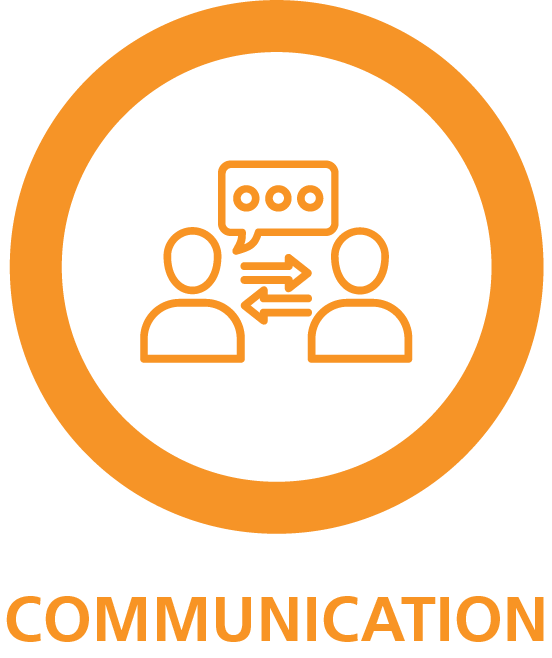
|
Modify communication style and conversations appropriately to individuals, carers, family and other healthcare professionals or partners including in person, telephone, video calls and digital communication. |
Modify communication style and conversations appropriately to individuals, carers, family and other healthcare professionals or partners including in person, telephone, video calls and digital communication. |
Demonstrate core interpersonal skills (verbal and non-verbal communication, empathy, listening). |
Implement a range of skills and strategies to communicate with people effectively and concisely in a range of situations, seeking support from experienced colleagues in complex situations to ensure equitable provision of services. |
Lead by example by using the most appropriate communication approaches according to different needs, abilities and preferences of service users and their families and carers, adapting communication strategies to foster empowerment. |
Implement communication strategies to communicate complex information to a variety of stakeholders with the aim of influencing decisions and actions. |
Demonstrate highly developed communication skills and individualised approaches, collaborating across professional or partner and speciality boundaries, to effectively manage complex service or organisational risks. |
|
Recognise barriers to effective communication, including emotional, physical, cultural, language and cognitive, and modify your communication style to help overcome these. |
Apply rapport building skills, putting others at ease and listening to the service user’s story, asking relevant questions. |
Demonstrate core interpersonal skills (verbal and non-verbal communication, empathy, listening). |
Implement necessary communication adjustments with service users fostering inclusion and equity, whilst promoting service user participation in decision making. |
Facilitate the team to promote autonomy through advocacy, enabling service users and their families and carers to participate in decision making processes based around their values and preferences. |
Utilise advanced communication skills to engage in complex interactions with service users, their families and carers and multi-professional or partner teams in a way that is enabling and responsive to an individual’s needs and concerns, including collaborating to manage significant risk. |
Implement a positive approach to working with a broad and diverse population, challenging stigma, optimising communication for service user and service benefit. |
|
|
Identify interventions where behaviour change skills may be of benefit to the service user and appropriately handover to a dietetic assistant practitioner or registered dietitian for further assessment and intervention.3 |
Recognise when core behaviour change skills are required and use these techniques (with relevant additional training). |
Use core behaviour change skills to implement an appropriate intervention. |
Apply core behaviour change skills to implement an appropriate intervention. |
Implement enhanced behaviour change techniques with service users to empower the person to set their own goals and identify areas for change. |
Mentor others in developing and sustaining effective behaviour change techniques relevant to your area of practice. |
Advocate for the systemic integration of behaviour change skills at a service level and ensure the provision of appropriate training opportunities to support and sustain essential workplace competencies. |
|
|
Contribute alongside other team members in creating an inclusive learning environment by treating service users with respect and sensitivity to their diverse needs and experiences. |
Promote an inclusive learning environment by treating service users with respect and sensitivity to their diverse needs and experiences. |
Practise in an anti-discriminatory and inclusive manner, supporting people from marginalised groups. |
Facilitate an inclusive learning environment, actively supporting and advocating for service users from marginalised groups, ensuring equity, respect, and sensitivity to their diverse needs and experiences. |
Select tools and technologies to aid communication for service users with additional communication needs. |
Create a culture of inclusiveness and a positive approach to working with service users and partners so that people can represent themselves and communities can act together. |
Create an environment that ensures service user, family and carer voices are adequately represented in design and evaluation of service use supervision pathways, including co-production of novel approaches. |
|
|
Report your interventions in full, clear and accurate records (including digital), within the scope of your role and practice, in accordance with applicable legislation, protocols and guidelines. |
Report your interventions in full, clear and accurate records (including digital), within the scope of your role and practice, in accordance with applicable legislation, protocols and guidelines. |
Maintain records appropriately (including digital). |
Report your interventions in full, clear and accurate records (including digital) in accordance with applicable legislation, protocols and guidelines. |
Adapt your communication methods to various settings, audiences, and contexts, ensuring inclusivity for diverse literacy levels, disabilities, ages and languages. |
Adapt your communication methods to various settings, audiences, and contexts, ensuring inclusivity for diverse literacy levels, disabilities, ages and languages. |
Adapt your communication methods to various settings, audiences, and contexts, ensuring inclusivity for diverse literacy levels, disabilities, ages and languages. |
|
| Research and Evidence | Supportive | Assistive | Pre-Entry | Entry | Enhanced | Advanced | Consultant |
|
EVIDENCE-BASED PRACTICE Assessing need and prioritising focus to inform practice and should have or be developing the capability to: 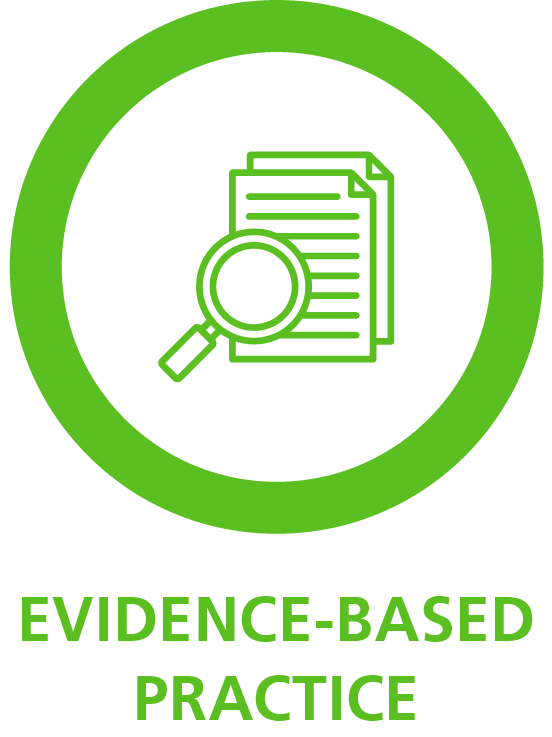
|
Recognise the importance of evidence-based practice and aware of where to find relevant and appropriate sources of evidence |
Contribute to basic systematic information searches using appropriate tools and databases to identify information and evidence relevant to answering practice-based enquiries, with guidance. |
Gather and analyse relevant information in a structured holistic way. |
Undertake basic systematic information searches using appropriate tools and databases to identify information and evidence relevant to answering your practice-based enquiries. |
Undertake systematic information searches confidently using appropriate tools and databases to identify and interpret information relevant to addressing your practice-based inquiries. |
Undertake advanced information searches using a range of software, databases, resources and techniques, critically appraising the outcomes and using the results to underpin your practice and to inform that of others. |
Lead on the development of new insights from an in-depth understanding of the latest evidence within your scope of practice including the experiences of people accessing the service. |
|
Apply changes in the evidence base and practice guidance to adapt and enhance practice with guidance. |
Apply changes in the evidence base and practice guidance within the scope of your role and practice. |
For detailed guidance and additional information specific to the Pre entry level of practice, please refer to the 'BDA Common Assessment Tool (CAT)', available here. |
Apply evidence-based practice in all aspects of your service delivery and provide evidence based information to enable those accessing services to make informed choices. |
Supervise colleagues with less experience to access, understand, appraise and translate evidence into practice. |
Plan and pursue opportunities to develop and apply new knowledge to own and others’ practice in structured ways that can be evaluated. |
Facilitate others’ critical understanding of differing research methods and analytical approaches. |
|
|
Recognise and comply with research governance, ethics, and protocols, and may carry out routine research activities under guidance of more experienced staff |
Apply research governance, ethics and protocols and undertake delegated research activities including using data collection and analysis. |
Use reasoning to make judgements in prioritising focus. |
Apply knowledge, understanding and reason to identify the differences and relationships among audit, service evaluation, quality improvement and research, and apply these insights to make informed judgements. |
Evaluate critically appraised evidence to address problems and questions arising in your practice, using your judgement and seeking guidance from more experienced colleagues where appropriate. |
Critically evaluate the evidence base (relative to your specialism, pathway or service) to develop and clearly articulate research questions that address the needs and priorities of your practice. |
Contribute to, or lead on embedding of an organisational culture that values and enables equitable engagement in, and with, research and quality improvement initiatives. |
|
|
Apply knowledge and skills in using information technology systems to access resources e.g. clinical guidelines and policies, relevant publications. |
Identify, assess and apply relevant guidelines to your area of practice. |
Apply appropriate evidence base, working within policy, procedures and guidance. |
Adhere to research governance, including 'Good Clinical Practice', ethics, data protection and confidentiality. |
Implement identified changes to service delivery, including contributing to updating local or your speciality practice protocols, guidelines and procedures. |
Direct and be accountable for application of new evidence into practice through the production of local, national or international guidelines, policy, educational delivery and resource development. |
Synthesise knowledge, evidence and experience of national and international developments in your area of practice to influence how services are developed across disciplines and beyond institutions. |
|
|
STRATEGY AND OUTCOMES Producing strategy and outcome data and should have or be developing the capability to: 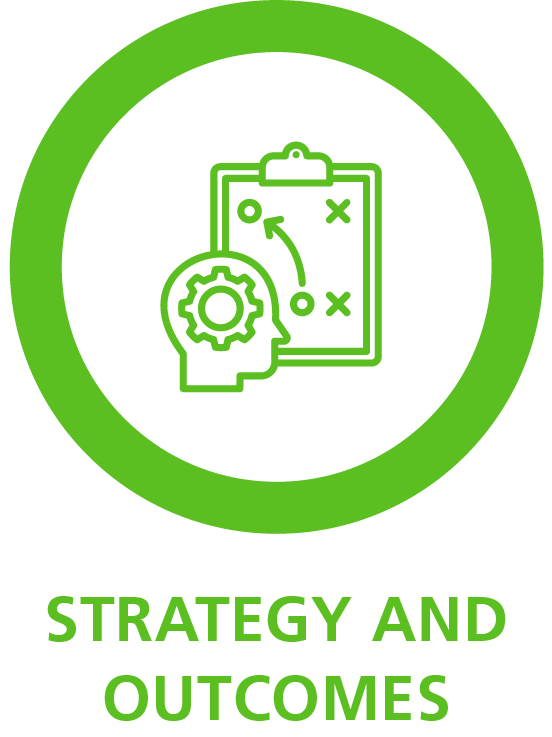
|
Apply a solution focused approach to problems in your practice and take appropriate action including escalating to registered team member. |
Identify problems with individual service user care in your practice and take action to solve the problem. |
Use problem-solving skills to make judgements in prioritising actions. |
Apply knowledge to solve problems creatively, making judgements which require analysis and interpretation. |
Initiate creativity in finding solutions to problems in your practice and that of the service. |
Develop original and creative solutions to complex problems and supervise others to do the same. |
Develop highly specialised theoretical and practical knowledge to formulate original and creative solutions to highly complex problems. |
|
Recognise why dietetic outcome indicators and quality measures should be used in practice. |
Recognise why dietetic outcome indicators and quality measures should be used in practice. |
Incorporate a range of outcome and quality measures into practice. |
Implement and interpret relevant outcome measures in your practice, understanding the strengths and weaknesses of each. |
Evaluate the effectiveness of range of outcome and quality measures, critiquing and selecting them appropriately for use in inquiry-based projects. |
Champion the dietetic role in research to transform service design and delivery and the outcomes and experiences of individuals and communities. |
Create a range of quality indicators and outcome measures to critically analyse and evaluate the effectiveness of service user experience and service delivery. |
|
|
Recognise which dietetic outcome indicators and quality measures related to service user care should be recorded as part of your practice. |
Select and record appropriate dietetic outcomes in your practice. |
Incorporate a range of outcome and quality measures into practice. |
Interpret and reflect on research evidence and other information relevant to your practice to optimise the outcomes and experiences of individuals and communities. |
Collaborate with more experienced colleagues to analyse the outcomes of knowledge creation activities, benchmark them against your local or regional data where possible, and implement improvements as appropriate. |
Develop identifiable contributions to changes and developments in practice at service level that are informed by research findings. |
Lead, facilitate and network across professional and organisational boundaries to peer review, analyse and evaluate service delivery, safety, quality, and health outcomes from pathway to system level. |
|
|
QUALITY IMPROVEMENT Improving and assuring the quality of service and should have or be developing the capability to: 
|
Contribute to audit, service evaluation and quality improvement activities such as service user feedback and benchmarking. |
Contribute to, and may lead, audits, service evaluation and quality improvement activities relevant to your work. |
Contribute to research, service evaluation or audit work. |
Apply knowledge of quality improvement methodologies to local service evaluation, audit and service improvement initiatives. |
Lead service improvement and audit projects, applying quality improvement methodologies and embracing digital technologies applying findings to your area of practice. |
Supervise learners and less experienced practitioners to publish, disseminate, promote and implement the outcomes and findings of their quality improvement and research projects. |
Influence and, where appropriate, lead the regional or national agenda of service evaluation and audit activity programmes or strategies. |
|
Recognise the research priorities for the service and within the context of your own work, with guidance. |
Recognise the research priorities for the service and within the context of your own work, with guidance. |
Contribute to research, service evaluation or audit work. |
Apply awareness of studies being undertaken in your own service, department and organisation, and how to refer people to research delivery teams to discuss possible recruitment to studies. |
Liaise with people who access services to evaluate whether service improvement and evaluation projects address health inequalities and meet the needs of the local population. |
Design, lead and undertake quality improvement initiatives, service evaluation and audit projects across professional boundaries, addressing local, regional and national advanced practice. |
Contribute to or lead high-quality research projects at organisational or national level to address recognised practice-based research priorities. |
|
|
Not applicable. |
Assist those in supportive level roles in undertaking research, service evaluation or audit work. |
Contribute to research, service evaluation or audit work. |
Guide members of the dietetic support workforce in undertaking research, service evaluation or audit work. |
Supervise the development of team capability to perform audit, service evaluation and quality improvement activities and translate findings into their practice. |
Contribute to and support the delivery of research designed by others to address issues arising in practice. |
Lead service evaluation and audit activity to generate research questions and translate into large-scale local, regional or national quality improvement initiatives related to area of practice. |
|
|
Recognise potential improvements to your service user care based on reflections of your practice and discuss ideas with a member of the registered dietetic team. |
Identify and suggest service improvements to mitigate risk of patient harm, and with support seek to identify the solutions. |
Reflect on and identify issues where practice is ineffective or inefficient, seeking solutions with support. |
Review your and others’ practice, identifying opportunities and solutions to enhance practice and services. |
Facilitate the use of research evidence to constructively challenge practice that undermines the quality of services or the delivery of expected outcomes for individuals and communities. |
Advocate for a culture in which practice is continuously measured, evaluated, reviewed and improved through quality improvement and research initiatives. |
Critically appraise and supportively challenge current service provision, proposing and leading research or service improvement within complex and unpredictable contexts. |
|
|
Measure and record quality performance indicators as directed by your service lead. |
Contribute to the implementation and evaluation of service improvement initiatives. |
Take responsibility for the quality of the service provided by acknowledging where a service falls short. |
Apply findings and recommendations of service improvement initiatives to evaluate your practice and prioritise areas for improvement. |
Disseminate service evaluation and audit outcomes at a local level and implement evidence based improvement strategies. |
Disseminate service evaluation and audit outcomes at local, regional or national forums to lead change in current and future practice, generate research questions and influence quality improvement strategies. |
Act as a peer reviewer for national, regional and local level publications and consultations, representing dietetics and / or your service. |
|
| Facilitated Learning | Supportive | Assistive | Pre-Entry | Entry | Enhanced | Advanced | Consultant |
|
INFORMATION AND RESOURCE DEVELOPMENT Developing resources and sharing knowledge and skills with others to support service delivery and should have or be developing the capability to: 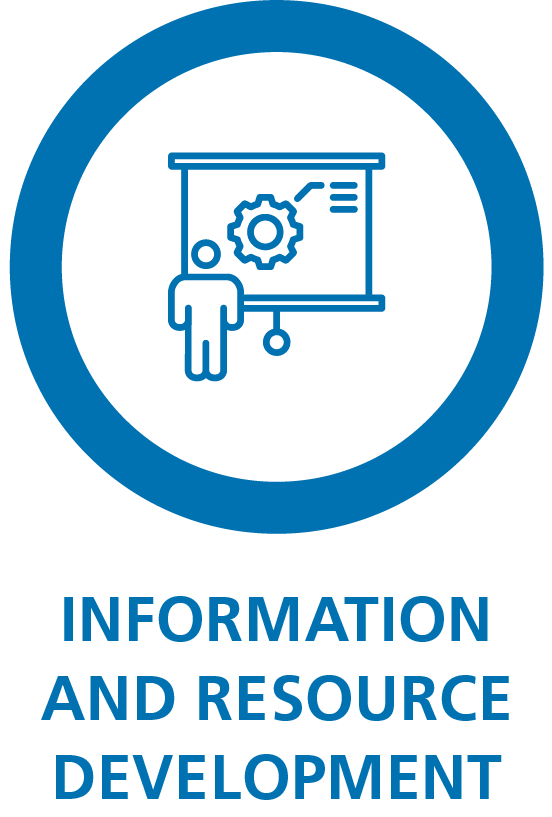
|
Assist in the delivery of a group education sessions or programmes to service users and staff, using a limited range of teaching and learning techniques. |
Prepare and deliver education sessions or programmes including answering straightforward questions and identify and signpost when further information or guidance is required. |
Use core group facilitation skills when developing and teaching knowledge and skills to others. |
Implement a range of learning and teaching techniques to facilitate your group education sessions or programmes, and to deliver formal and informal presentations. |
Implement a broad range of teaching and learning techniques, along with interpreting educational theory, to develop, deliver and evaluate effective learning opportunities for all stakeholders. |
Design and deliver education tailored to postgraduate learners across professional boundaries, inside and outside the organisation. |
Implement effective facilitation skills and varied learning strategies within different situations, developing person centred, safe, effective workplace learning, from professional practice to system-wide levels. |
|
Support the evaluation of group education sessions or programme analysing feedback data with guidance, contributing to the assessment of outcomes and area for improvement. |
Evaluate group education sessions or programmes, analyse outcomes, and present findings in a report, identifying strengths and highlighting areas for improvements for future sessions. |
Use core group facilitation skills when developing and teaching knowledge and skills to others. |
Apply innovative methods to gather user feedback, evaluate education sessions, and incorporate these insights to enhance further session quality and effectiveness. |
Evaluate the effectiveness of your educational content, making improvements in response to feedback and changes to internal and external policies and guidelines. |
Optimise the impact and effectiveness of your educational content, implementing enhancements informed by aligning with evolving national and international policies and guidelines. |
Drive the strategic enhancement to educational content, by integrating stakeholder feedback, and aligning with evolving national and international policies, guidelines, and best practices ensuring optimal effectiveness and impact. |
|
|
Identify strengths and weaknesses of your educational sessions through reflection and, with support use these insights to improve your further sessions. |
Identify strengths and weaknesses of your educational sessions through reflection and, with support use these insights to improve your further sessions. |
Use core group facilitation skills when developing and teaching knowledge and skills to others. |
Identify strengths and weaknesses of your educational sessions and through reflection and, with support use these insights to improve your further sessions. |
Contribute to local dissemination of information and education for best practice within your area of practice, for both service users and other professionals. |
Lead national dissemination of information and education for best practice within your area of practice, for both service users and other professionals. |
Lead the strategic development, evaluation and international dissemination of educational content, ensuring its effectiveness and impact through continuous refinement informed by global stakeholder feedback and aligned with evolving international policies, guidelines, and best practices. |
|
|
Assist with a range of teaching and learning activities. |
Select and use a range of teaching and learning methods to meet defined learning outcomes. |
Use core presentation skills when sharing knowledge and skills with others. |
Review and create educational resources applying principles of co-production and discuss appropriateness to implement into local practice with the team. |
Educate and disseminate knowledge to a range of stakeholders through a variety formats including face to face, and digital platforms. |
Contribute to creation of postgraduate learning modules utilising a wide range of dissemination strategies, including providing supervision and education across professional or organisational boundaries. |
Design, deliver, disseminate and evaluate innovative and evidenced informed postgraduate teaching strategies across professional boundaries, inside and outside the organisation. |
|
|
Contributes to the development of basic information and resources to support service delivery. |
Assist in developing resources including coproduction with service users. |
Appraise and creates resources, with support, valuing co-production, accurate information, clear communication, impact and relevance. |
Contribute to the development of accessible resources and teaching materials for learning and development of others. |
Facilitate a team approach to appraisal and evaluation of learning resources critiquing relevance, quality and effectiveness for use in practice. |
Contribute to organisational learning culture, inspiring the workforce through leadership of learning initiatives and postgraduate education, implementing active learning opportunities. |
Create and advertise innovative and multimodal educational resources that meet the needs of the multiprofessional or multiagency team. |
|
|
Assist in finding and appraising external resources to ensure they are fit for purpose and feed back to colleagues. |
Identify and signpost service users to relevant resources and support services related to your area of practice. |
Appraise and creates resources, with support, valuing co-production, accurate information, clear communication, impact and relevance. |
Contribute to the evaluation of learning resources, considering accessibility and potential for improvement. |
Develop educational resources in various accessible formats to facilitate education of pre- and post registration learners, other stakeholders. |
Develop, implement and evaluate a wide range of theoretical teaching and training models according to target audience, desired learning outcomes and resources. |
Lead and contribute to national and international education forums including organisation of conferences and conference programmes; webinars and online education programmes. |
|
|
SELF-DEVELOPMENT Assuring and developing knowledge, skills and behaviours and should have or be developing the capability to: 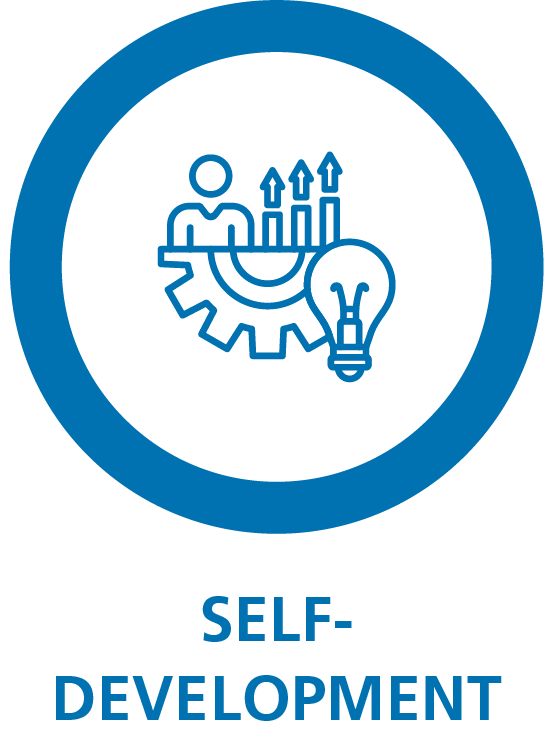
|
Access supervision or mentoring (as available) to help you identify ways you develop your practice. |
Reflect on work-based learning through supervision conversations to enhance self-awareness, gain new insights and identify your learning needs. |
Access supervision and mentorship to identify needs and seeks opportunities to develop your practice. |
Actively participate in reflection, supervision, peer support and mentorship to improve your practice. |
Contribute to the overall management of yourself and others through coaching principles and theories and apply best practice methods for supervision, mentoring and preceptorship. |
Lead and facilitate supervision and debrief sessions within the multiprofessional or multi-agency team to foster learning for yourself and others. |
Facilitate professional development that improves people’s leadership abilities, including mentorship, coaching, and feedback skills, and how they learn from mistakes and build on what works well. |
|
Recognise and articulate your learning needs across the four pillars of practice, through self-reflection, supervision and evaluation of your practice. |
Identify opportunities to seek and receive feedback in an open, honest and constructive manner to facilitate learning and development. |
Review and reflect on your practice using multi-source feedback or coaching, to improve. |
Embrace preceptorship to build confidence and competence with practice and teaching skills. |
Use reflection and supervision to actively improve your service delivery. |
Engage in supervision and debrief activities, to recognise the boundaries of your scope at an advanced level of practice. |
Seek feedback from diverse peers, mentors, and clinical supervisors to identify personal learning needs and negotiate a development plan that enhances growth across all pillars of practice. |
|
|
Participate in learning opportunities to ensure you have the necessary knowledge, skills, and behaviours to safely perform your role. |
Recognise your own learning needs, identifying and managing opportunities to maintain and extend knowledge. |
Review and reflect on your practice using multi-source feedback or coaching, to improve. |
Identify your own development needs and proactively seek opportunities to develop yourself and your practice. |
Develop a long-term and strategic approach to personal and professional development, incorporating your development needs and aligning personal goals with the organisational strategy. |
Negotiate a personal development plan, to demonstrate commitment to lifelong learning, identifying opportunities that advanced dietetic practice and align personal goals with organisational strategy. |
Formulate the development and maintenance of your own skills and knowledge relevant to the scope of role, which may include doctorate level qualification, seeking peer supervision and demonstrating commitment to life-long learning. |
|
|
Identify and record your own learning and personal development, actively seek feedback on performance identifying areas for improvement. |
Identify and record your own learning and personal development, actively seek feedback on performance identifying areas for improvement. |
Review and reflect on your practice using multi-source feedback or coaching, to improve. |
Reflect on your practice, seeking feedback and applying this to improve your practice. |
Reflect regularly on your learning and development opportunities to identify and pursue further progress in your professional growth. |
Reflect on your actions, seek peer reviews and engage in ongoing learning to increase your effectiveness and guide your career planning. |
Lead peer learning reviews and ongoing learning and development systems and evaluate their effect on service users and their families, carers and staff, and services. |
|
|
Contribute to the induction, training and mentoring of new support staff, along with pre-registration learners and apprentices in respect of tasks and responsibilities within your own scope of role and practice. |
Contribute to supervision, support and mentoring of other support workers, apprentices and pre-registration learners with practice-based learning (although will not be responsible for signing off learner competence). |
Engage in supervision of others. |
Contribute to coaching and mentoring of pre-registration learners and dietetic support workers, developing the necessary skills through participation in mentoring and coaching programmes. |
Engage in internal peer review processes to enable your and others’ learning and development. |
Mentor, coach and supervise the development of individuals from your team and those from other professions and agencies, advocating and developing opportunities for multiprofessional or multi-agency learning and application of learning to practice. |
Mentor, coach and supervise the development of individuals from your team and those from other professions and agencies, advocating and developing opportunities for multiprofessional or multi-agency learning and application of learning to practice. |
|
| Leadership | Supportive | Assistive | Pre-Entry | Entry | Enhanced | Advanced | Consultant |
|
STRATEGY AND VISION Contributing to organisational strategy and should have or be developing the capability to: 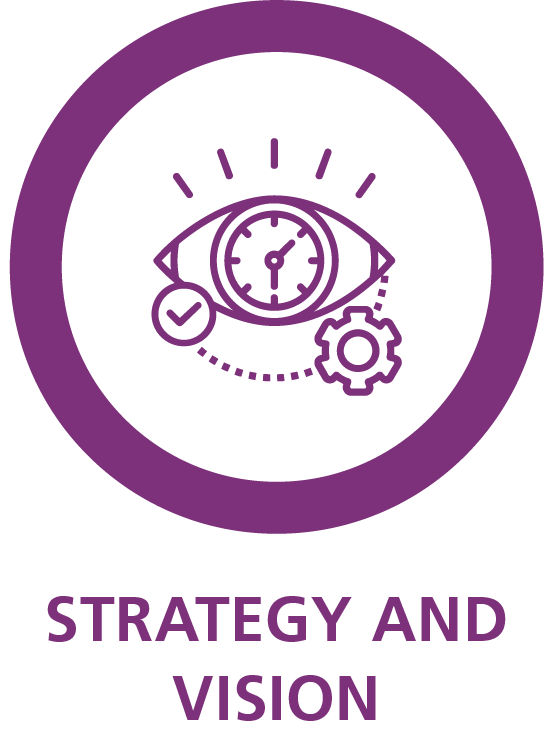
|
Act as a positive role model at all times, applying principles of role modelling including advocating for the dietetic support workforce. |
Apply principles of role modelling, including advocating for the dietetic workforce. |
Actively seek to promote the profession. |
Recognise your own role as a leader, promoting the role of dietetics, explaining the core principles of your profession. |
Role model the importance of self-awareness, emotional intelligence and resilience within your own role, and engage in courageous conversations when advocating for yourself and others. |
Role model the values implicit in compassionate, inclusive and authentic leadership, ensuring person-centred approaches to practice, team engagement and workforce development. |
Role model a strong, visible dietetic leadership presence to represent the profession at a strategic level within and beyond organisational boundaries. |
|
Identify and develop leadership skills within the scope of your role, and practice with appropriate guidance. |
Identify and develop your own leadership skills for your own work, within the scope of your role, and practice. |
Actively seek to promote the profession. |
Develop and refine your leadership qualities and behaviours strengthening your abilities to motivate, influence and negotiate. |
Apply appropriate leadership styles and approaches, recognising the impact on fostering the growth, motivation, diversity, belonging and successful teamwork. |
Lead culture change and promoting growth within your teams/local services. |
Lead, promote and grow the profession, advocating for person-centred, compassionate and values-based principles, driving cultural shifts where needed. |
|
|
Recognise how your objectives and actions contribute to service delivery, and the future direction and vision. |
Contribute to achieving your team and service or project objectives within the scope of your role, and practice. |
Know how their objectives and actions contribute to achievement of the service. |
Review service delivery as part of a team, contributing ideas about future direction and vision of your team and service. |
Lead through inspiring a shared purpose and vision, including contributing to strategy development at local and regional level. |
Evaluate key drivers and policies which influence strategy and service development and analyse how these can be used to improve service delivery, new practice and service redesign, working across boundaries and broadening sphere of influence. |
Develop strategic relationships with service commissioners to influence and advocate for service provision locally and nationally. |
|
|
Recognise sustainability messages related to your workplace and assist with implementation of sustainability initiatives within your area of practice. |
Lead on the implementation of sustainability initiatives within your area of practice. |
Practise sustainability by reducing environmental impact on workplace. |
Contribute and advocate for embedding sustainability initiatives into your area of practice. |
Initiate the development of a local sustainability plan, including workplace environment and workforce components. |
Evaluate the sustainability and environmental impact of your own and team decisions and actions, and advocate for a commitment to minimise any resultant negative effects on planetary health. |
Leverage sphere of influence as a consultant dietitian to advocate for and drive a commitment to minimising negative impacts on planetary health. |
|
|
MANAGING CHANGE Working within a changing environment and should have or be developing the capability to: 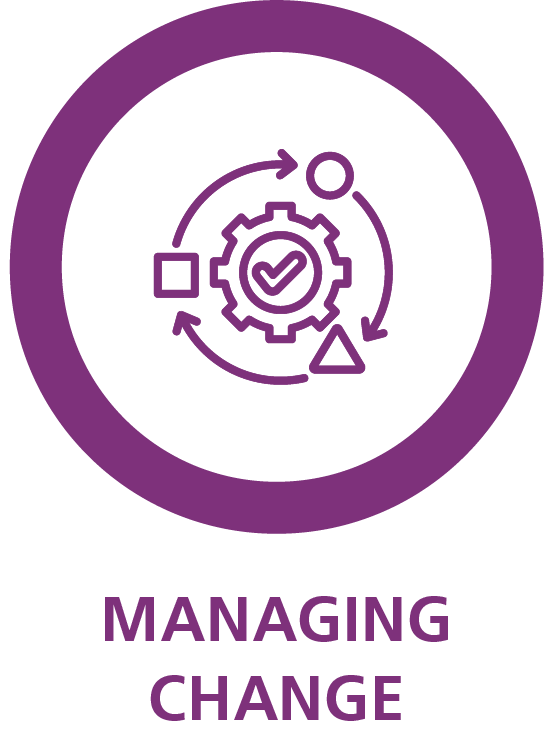
|
Recognise the ever-changing work environment and demonstrate flexibility and adaptability in response to these changes. |
Identify strategies to adapt workplace changes and respond flexibly to changes in service demands. |
Respond appropriately when plans change at short notice. |
Recognise the need for changes to established practices and adapt your approach to contribute to proposed improvements. |
Facilitate a culture of empowerment to enable concerns related to managing change in complex situations and systems, to be raised, addressed and/or appropriately escalated. |
Implement change management techniques, leading the team through changes or situations that are unfamiliar, complex or unpredictable and seeking to build confidence in others. |
Implement and demonstrate leadership skills to empower the workforce with original and creative solutions to address complex changes in culture that must be delivered within the available resources. |
|
Identify issues with service delivery and actively seek to change them, with support as necessary. |
Contribute to alternative ways to working within a changing environment whilst maintaining quality. |
Share own concerns, identifies problems, and seeks with support to improve. |
Review and develop services as part of a team, and evaluate the effect and outcomes of change, recognising and influencing a change in culture where needed. |
Lead and participate in changes to improve a service within your area of work, including understanding the impact it has on your role, utilising theory and evidence to underpin the change process. |
Lead change, considering cultural and political considerations, evaluating the impact and outcomes of change on service delivery and the experiences of those who access services. |
Implement a broad range of strategies to bring about change through influence, including legislative and other change at national and international levels. |
|
|
Identify issues with service delivery and actively seek to change them, with support as necessary. |
Contribute to alternative ways to working within a changing environment whilst maintaining quality. |
Share own concerns, identifies problems, and seeks with support to improve. |
Recognise when professional values are at risk of being compromised and understand when it is necessary to escalate concerns. |
Contribute to creating opportunities for people to engage in decision-making, constructively challenging ideas and reconciles conflicting perspectives. |
Construct evidence-based challenge to proposed approaches or changes that may have wider impacts on service delivery and escalate concerns through the appropriate channels when necessary. |
Create authentic constructive challenges to proposed service-delivery changes that do not appear to be in the best interests of the service or its users and negotiate counter offers and acceptable compromises as needed. |
|
|
ADVOCACY Contributing to advocacy efforts related to nutrition and health and should have or be developing the capability to: 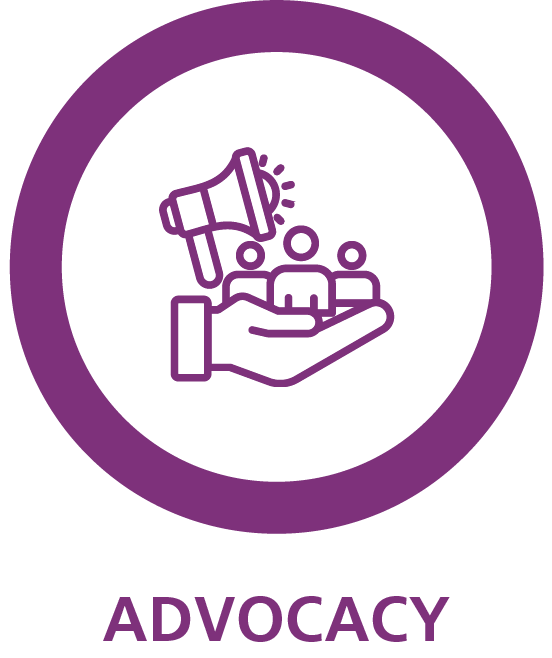
|
Contribute to advocacy efforts to improve the nutrition and health of service users within your role. |
Recognise the social, economic and environmental factors that impact on an individual’s nutrition, health and wellbeing. |
Support others to improve their health and wellbeing by communicating health promotion messages. |
Recognise and respond when social, economic and environmental factors influence an individual’s nutrition, health and wellbeing, whilst advocating for their needs and equitable access to services. |
Contribute to working with dietitians within and outside the health and social care system to achieve effective, equitable and sustainable food, nutrition, and health policies. |
Lead on advocacy strategies, actively engaging stakeholders to promote health and reduce the burden of chronic disease across a specialism, pathway or service. |
Influence and shape policy frameworks on a national or international scale, forging strategic alliances across multiple sectors to drive equitable, sustainable, and evidence-based solutions that address complex nutrition and health challenges. |
|
Recognise the wider determinants of health and health inequalities of service users within your role. |
Contribute to educating your service users so they can make well informed healthcare decisions. |
Support others to improve their health and wellbeing by communicating health promotion messages. |
Educate, and promote health to empower and enable your service users to play a part in managing their own health and preventing ill health. |
Advocate for measures that encourage reduction in health inequalities, promotion of the unique role of nutrition and dietetics practitioners and enhance health and nutritional status while protecting the public. |
Develop partnerships and collaborate with others within and across organisational and agency boundaries, including local community groups and charities, to promote health and wellbeing. |
Create and commit to addressing and improving health inequality, equitable access, quality of experience and the wider social determinants of health. |
|
|
Contribute to person-centred care by recognising service users’ values, preferences, and healthcare needs. |
Contribute to advocating for person-centred care for service users, their families and carers. |
For detailed guidance and additional information specific to the Pre entry level of practice, please refer to the 'BDA Common Assessment Tool (CAT)', available here. |
Advocate and lead the delivery of person-centred care, championing the needs and rights of service users, their families and carers. |
Identify and understand the social, economic and health inequalities, that influence your area of practice. |
Develop and implement strategies informed by an evaluation of social, economic and health inequalities factors, to advance and shape your area of practice. |
Facilitate service user-centred, multiprofessional and multi-agency discussions, collaborating with service users, families and carers, to promote an environment of patient advocacy and professional autonomy. |
|
|
Recognise the different roles of the multiprofessional or multi-agency team, contributing to team working with guidance. |
Recognise the different roles of the multiprofessional or multi-agency team, supporting the timely referral of appropriate patients within agreed protocols. |
Use collaborative team working skills (own, multiprofessional or multi-agency). |
Apply collaborative team working skills (own, multiprofessional or multi-agency) as you gain further experience, contributing to group decision making. |
Facilitate collaborative practice through regular input into ward rounds and multiprofessional or multi-agency forums, including the service users and their family in discussions whenever feasible. |
Facilitate collaborative working with multiprofessional or multi-agency teams, developing, and maintaining, working relationships across organisations and settings. |
Collaborate with key partners at regional, national and international levels to create a bold and innovative shared vision, in line with the future needs and aims of the service across health systems. |

